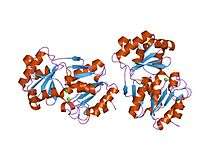Haloacid dehydrogenase superfamily
The haloacid dehydrogenase superfamily (HAD superfamily) is a superfamily of enzymes that include phosphatases, phosphonatases, P-type ATPases, beta-phosphoglucomutases, phosphomannomutases, and dehalogenases, and are involved in a variety of cellular processes ranging from amino acid biosynthesis to detoxification.[1][2]
| Hydrolase_3 | |||||||||
|---|---|---|---|---|---|---|---|---|---|
 crystal structure of had-like phosphatase yida from e. coli | |||||||||
| Identifiers | |||||||||
| Symbol | Hydrolase_3 | ||||||||
| Pfam | PF08282 | ||||||||
| Pfam clan | CL0137 | ||||||||
| InterPro | IPR013200 | ||||||||
| |||||||||
Examples
A HAD domain is found in several distinct proteins including:
- Phospholipid-translocating ATPase EC 3.6.3.1, a putative lipid-flipping enzyme involved in cold tolerance in Arabidopsis [3]
- 3-deoxy-D-manno-octulosonate (KDO) 8-phosphate phosphatase (EC 3.1.3.45), which catalyses the final step in the biosynthesis of KDO - a component of lipopolysaccharide in Gram-negative bacteria[4]
- Mannosyl-3-phosphoglycerate phosphatase (EC 3.1.3.70), which hydrolyses mannosyl-3-phosphoglycerate to form the osmolyte mannosylglycerate[5]
- Phosphoglycolate phosphatase (EC 3.1.3.18), which catalyses the dephosphorylation of 2-phosphoglycolate[6]
- 5´-Nucleotidase (EC 3.1.3.5) which either catalyzes the hydrolysis of IMP.[7] or IMP and GMP[8]
- Hypothetical proteins[9]
Human genes encoding proteins that contain this domain include:
gollark: TV licenses aren't EXACTLY that, they're weirder.
gollark: The UK does free terrestrial TV, I don't think satellite is much of a thing here.
gollark: They were initially meant to be reducing the number of people going, in the UK.
gollark: But also do consider the future somewhat because not doing that would be bad.
gollark: Never mind, I checked the internet, now I have a rough idea.
References
- Koonin EV, Tatusov RL (November 1994). "Computer analysis of bacterial haloacid dehalogenases defines a large superfamily of hydrolases with diverse specificity. Application of an iterative approach to database search" (PDF). Journal of Molecular Biology. 244 (1): 125–32. doi:10.1006/jmbi.1994.1711. PMID 7966317.
- Srinivasan B (2011). Structure function studies on three members of the haloacid dehalogenase (HAD) superfamily of enzymes. Bangalore: JNCASR.
- Gomès E, Jakobsen MK, Axelsen KB, Geisler M, Palmgren MG (December 2000). "Chilling tolerance in Arabidopsis involves ALA1, a member of a new family of putative aminophospholipid translocases". The Plant Cell. 12 (12): 2441–2454. doi:10.2307/3871240. PMC 102229. PMID 11148289.
- Wu J, Woodard RW (May 2003). "Escherichia coli YrbI is 3-deoxy-D-manno-octulosonate 8-phosphate phosphatase". The Journal of Biological Chemistry. 278 (20): 18117–23. doi:10.1074/jbc.M301983200. PMID 12639950.
- Empadinhas N, Marugg JD, Borges N, Santos H, da Costa MS (November 2001). "Pathway for the synthesis of mannosylglycerate in the hyperthermophilic archaeon Pyrococcus horikoshii. Biochemical and genetic characterization of key enzymes". The Journal of Biological Chemistry. 276 (47): 43580–8. doi:10.1074/jbc.M108054200. PMID 11562374.
- Kim Y, Yakunin AF, Kuznetsova E, Xu X, Pennycooke M, Gu J, Cheung F, Proudfoot M, Arrowsmith CH, Joachimiak A, Edwards AM, Christendat D (January 2004). "Structure- and function-based characterization of a new phosphoglycolate phosphatase from Thermoplasma acidophilum". The Journal of Biological Chemistry. 279 (1): 517–26. doi:10.1074/jbc.M306054200. PMC 2795321. PMID 14555659.
- Srinivasan B, Balaram H (2007). "ISN1 nucleotidases and HAD superfamily protein fold: in silico sequence and structure analysis". In Silico Biology. 7 (2): 187–93. PMID 17688444.
- Srinivasan B, Forouhar F, Shukla A, Sampangi C, Kulkarni S, Abashidze M, Seetharaman J, Lew S, Mao L, Acton TB, Xiao R, Everett JK, Montelione GT, Tong L, Balaram H (March 2014). "Allosteric regulation and substrate activation in cytosolic nucleotidase II from Legionella pneumophila". The FEBS Journal. 281 (6): 1613–1628. doi:10.1111/febs.12727. PMC 3982195. PMID 24456211.
- Srinivasan B, Kempaiah Nagappa L, Shukla A, Balaram H (April 2015). "Prediction of substrate specificity and preliminary kinetic characterization of the hypothetical protein PVX_123945 from Plasmodium vivax". Experimental Parasitology. 151-152: 56–63. doi:10.1016/j.exppara.2015.01.013. PMID 25655405.
This article is issued from Wikipedia. The text is licensed under Creative Commons - Attribution - Sharealike. Additional terms may apply for the media files.